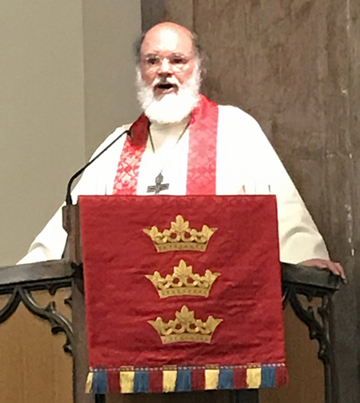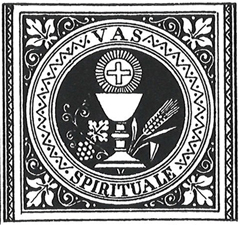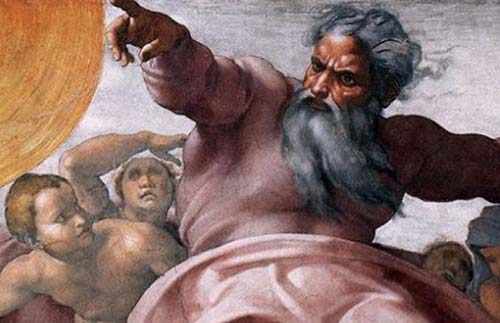Online Good Friday Liturgy
April 10, 2020
|
| |
|
Bulletin Cover
|

Jesus cried out with a
loud voice [voce magna],
“My God, my God,
why have you forsaken me?”
(Matthew 27:46)
Good
Friday
|
Online Abbreviated Liturgy
Pastor Marshall
April 9, 2020
In the Name of God the Father, Son, and Holy Spirit.
Amen.
Let us pray:
Heavenly Father, we thank you for our Savior, Christ Jesus, who
gave himself as a sacrifice for our sins – that we might be
saved from your wrath, walk in newness of life, and dwell in
heaven forever. Trusting in his mercy, in the name of Jesus we
pray. Amen.

|
First Lesson: Isaiah 52:13–53:12
Psalm 22:1–23
Second Lesson: Hebrews 4:14–16, 5:7–9
Gospel: John 18:1–19: 42
|
Opening Hymn:
“Go to Dark Gethsemane” (LBW 109)
|
|
| |
|

Sermon:
April 10, 2020
“Don't
Miss the Noise”
(Matthew 27:46)
Grace and peace to you in the name of God the Father, Son, and
Holy Spirit. Amen.
What’s all of the racket about on Good Friday? Do you hear the
noise at the end of the crucifixion of Jesus? Be sure not to
miss it even if where you are right now is all calm, quiet, and
comfortable.
Don’t forget that earthquake – when “the earth shook, and the
rocks were split” (Matthew 27:51). Did you hear the great
banging, cracking and rumbling going on? Maybe there was even
some thunder and lightning with the attending noonday darkness
(Mark 15:33, Luke 23:45). And there’s more. We even hear Jesus
roaring out with a loud voice over the clamor (Matthew 27:46,
50, Mark 15:34, 37, Luke 23:46). He cries out to God, “Why have
you forsaken me?” (Matthew 27:46, Mark 15:34). He also says, “It
is finished!” (John 19:30). And he adds, “Into your hands, O
Lord, I commend my spirit” (Luke 23:46).
All this noise and crying out is for bringing the crucifixion
into focus. So dwelling on earlier words of Jesus from the cross
would be the wrong way to go. Just focus on the last few words.
Don’t get caught up in the sentimentality of Jesus asking John
to take care of his mother (Jon Meacham,
The Hope of Glory: Reflections on the Last Words of Jesus from the Cross,
New York: Random House, 2020, p. 59). Martin Luther knew about this
dead end and vilified it. He argued that when Jesus gave his
mother away he wasn’t looking out for her after he was gone as
you might reasonably suppose. He instead was demoting her by
removing her from the scene of redemption. That’s because
redemption was his work alone – something that he had to do all
by himself in his suffering and dying on the cross (Luther’s Works 69:262). Unfortunately many don’t see that and still
believe that Mary has to help Jesus save us from our sins [Catechism of the Catholic Church (1994, 1999) §§ 494, 964, 969,
1370, 1477, 2618, and The
Devotion of the Seven Sorrows of the Blessed Virgin Mary
(1239), The Fatima Center – noting the 5th Sorrow on the need
for two sacrifices at the Cross: one from Jesus and the other
from Mary].
That’s why we need the crashing and banging. All that noise
brings the crucifixion into its proper focus. What we then see
is that Jesus was forsaken by God on the cross. And why was
that? Because God hated what Jesus had become (Leviticus 26:30,
Psalms 5:5, 11:5, 95:10, Proverbs 6:16, Jeremiah 12:8, Hosea
9:15) – the pin cushion for all of the sins of the world (1 John
2:2, 1 Peter 2:24). That’s why he cries out about being forsaken
– because he is speaking for all sinners being forsaken by God (Catechism
of the Catholic Church, §603). And where does that lead?
Because God wants to kill sinners (Isaiah 13:19, Hosea 9:16) –
he now must kill Jesus for being the worst of them all. And so
we have Jesus on the cross – “putting away sin by the sacrifice
of himself” – as the definite plan of God (Hebrews 9:26, Acts
2:23). No victim here; no accident either (John 10:18 –
contra “At the Lamb’s High Feast,” verse 2,
Lutheran Book of Worship, 1978, Hymn 210; and Gerhard O. Forde,
Theology is for
Proclamation, 1990, pp. 127–29).
But isn’t that the most preposterous story you’ve ever heard?
Why doesn’t God just cut sinners some slack and leave it at
that? – moving on to making this world a better place for us
all? Because first a payment has to be made –
Gott mit Christum bezahlen,
as Luther puts it – that is, “Pay God with Christ” (Luther’s
Works 30:12). This infuriates those looking for a simpler,
loving God who doesn’t have to be bought off as they
sarcastically say. They don’t want to hear that a ransom has to
be paid before God can forgive sinners and before his wrath can
be appeased and he can love us – because of the “profound idea
[that] it is not simple for God to forgive sins” (Paul Tillich,
A History of Christian Thought, ed. Carl E. Braaten, 1968, p. 166).
Martin Luther would never join those naysayers. He instead
celebrates this sacred sacrifice, this mediating ransom. He
first sets the stage by arguing that Christ is the mediator not
of one but of “two who were in the utmost disagreement” (LW
26:325). So both God and all people altogether have to be
reconciled to one another. Not just us, but God too. For one
can’t cover both. And neither can stand in for the other. Luther
further says that this ransom, and the reconciliation that it
brings, is needed because “God cannot and will not look kindly
on sin, but His wrath remains over sin eternally and
irrevocably.” Nothing can reverse that wrath. It stands. It’s
eternal and so we have no hope for recovery and a restored
relationship with God because he doesn’t want us. His wrath
prevails. “For this reason,” Luther continues, “a payment must
take place which would make restitution for sin, take God’s
wrath upon itself, make satisfaction, and pay, and thus take
away sin and cancel sin.” If that wrath isn’t lifted from God,
then all we’re getting from him are the “tortures” of hell that
last forever (Revelation 9:5). God has to be satisfied that a
sufficient punishment has been paid if we are going to get off
the hook. And we can do nothing to help. So when we look to God
all we get is wrath. For “to this day there has been no other
remedy nor help than this,” Luther argues, “that God’s eternal
Son thus stepped into our need and misery, Himself became a man,
and took such dread, eternal wrath on Himself, and for it
offered [Himself] as an offering and payment for sin.” And that
settled it. Without it we would still be looking divine wrath
squarely in the face. But not anymore. That’s because Jesus took
it away by painfully being struck by it himself, thereby
draining it from God – and making room for love. But don’t think
this attack on Jesus was fun for God. No, it was “costly to
God,” Luther notes, “because it is the blood of His own dear
Son, who is with him in one divinity and majesty.” So to strike
Jesus was to strike himself – and so his “heart recoils within”
him (Hosea 11:8). This is what it takes to change God into a
lover of sinners. But it works – and God is finally “reconciled
with us, takes us into His grace, and forgives sin.” But this
massive display of divine tectonics falls flat without faith in
Jesus. And so Luther concludes that we “benefit only from this
precious payment… if we hold to it with firm faith” (LW
57:283).
So believe in Jesus – and turn from being enemies of the cross
(Philippians 3:18) into being sweetly “disposed toward God” (LW
44:38). We believe that Jesus sacrificed his life on the cross
to his Father in heaven to move him to mercy (LW
51:277). That’s why the sacrifice was made to God (Luke 23:46,
Ephesians 5:2, Hebrews 9:14). And that’s what makes it sure and
finished (John 19:30). No wonder Jesus makes so much noise. No
wonder that he cries out with such “a loud shout like a most
courageous giant,” since he was entering upon his “death with
joy” because of the salvation it was bestowing on the world (LW
25:312). Therefore the cross “deserves to be praised to the
utmost and to have every honor given to it” (LW
13:319). And so on this Good Friday we do just that.
Added to our praise, let us also work for God – knowing that our
good deeds are worth as much as praying twice (LW
43:193). So help out as much as you can to stop the spread of
the coronavirus. Crazy things are happening these days in
America and we need cooler heads to prevail. The poor mayor of
Baltimore had to “beg residents to stop shooting each other so
hospital beds could be used for coronavirus patients” (CBS 13
WJZ, March 18, 2020). And remember Luther during the plagues of
his day. He longed to visit the dying, and yet had to follow the
ban against “distributing the sacraments to the sick” [Martin
Brecht, Martin Luther,
3 vols (1985–1993) 3:254; Erik A. Heinrichs,
Plague, Print, and the Reformation: The German Reform of Healing
1473–1573, 2018, p. 138]. So separate yourself from others as much
as you can. And also support research into the spread of
microbes – knowing that when diseases are stopped in poor
countries, the increased population creates terrible problems if
the healing is “not paired with broader gains in economic
development, governance, education, and infrastructure” (Thomas
J. Bollyky, Plagues and
the Paradox of Progress: Why the World is Getting Healthier in
Worrisome Ways, 2018, p. 177). So stay alert to these and
other projects – and do what you can to help out. Pray for God’s
help to make a difference. And when you struggle to do this,
don’t forget to rejoice in the noise at the end of the
crucifixion – which is all that can save us for all of eternity.
Amen.
Hymn of the Day:
“Ah,
Holy Jesus” (LBW 123)
Prayers
|
|
| |
|
Litany on the
Coronavirus
Disease
2019 (COVID-19)
Let us pray for all those worldwide who have
died from COVID-19. Lord in your mercy,
HEAR OUR PRAYER.
Let us give thanks for the government
agencies and other medical research teams who are diligently
working to curb the spread of this virus. Lord in your mercy,
HEAR OUR PRAYER.
Let us pray for the many who are sick and
suffering from this disease. Lord in your mercy,
HEAR OUR PRAYER.
And let us also pray for all those grieving
the loss of loved ones who have died from COVID-19. Lord in your
mercy,
HEAR OUR PRAYER.
Let us pray for the many who are caring for
the infected and the sick, that full health and strength and
peace may be granted. Lord in your mercy,
HEAR OUR PRAYER.
Let us pray for our world where we’re but
sojourners (Psalm 119:19; Philippians 3:20), that we may not be
punished by disease and pestilence (Ezekiel 14:21, Luke 13:5,
John 5:14), and that health and peace may abound for all – for
it is Christ who takes upon himself “our infirmities and
diseases” (Matthew 8:17). Lord in your mercy,
HEAR OUR PRAYER.
Finally, in our fear of disease and sickness
– may we ever remember God’s power to heal (Jeremiah 17:14,
James 5:14), those many kept safe from COVID-19 and other
infectious diseases, and our Savior Jesus who, by his mercy and
in his time, rekindles our faith by restoring health in this
vulnerable and perilous life (2 Kings 5:14, Acts 3:6).
GLORY BE TO CHRIST OUR LORD & GREAT HEALER!
AMEN.
|
|
| |
|
LUTHER on epidemics
“Some people are of the firm opinion that one… should not run
away from a deadly plague. Rather, since death is God’s
punishment, which he sends upon us for our sins, we must submit
to God…. I cannot censure [this] excellent decision…. It takes
more than a milk faith [1 Corinthians 3:2] to await a death
before which most of the saints… are in dread…. [But since] it
is generally true of Christians that few are strong and many are
weak, one simply cannot place the same burden upon everyone….
Peter could walk upon the water because he was strong in faith.
When he began to doubt,… he sank and almost drowned [Matthew
14:30]…. Let him who has a strong faith wait for his death, but
he should not condemn those who take flight…. [Even so, know
that] all illnesses are punishments from God…. [These
punishments] come upon us, not only to chastise us for our sins
but also to test our faith and love…. [So] my dear friends,… use
medicines… which can help you; fumigate house, yard, and street;
shun persons and places wherever your neighbor… has recovered,
and act like a man who wants to help put out the burning city.
What else is the epidemic but a fire?... You ought to think this
way: ‘Very well, by God’s decree the enemy has sent us poison….
Therefore I shall ask God mercifully to protect us. Then I
shall… administer medicine and take it. I shall avoid places and
persons where my presence is not needed in order not to become
contaminated and thus perchance infect and pollute others, and
so cause their death as a result of my negligence. If God should
wish to take me, he will surely find me and I have done what he
has expected of me and so I am not responsible for either my own
death or the death of others. If my neighbor needs me, however,
I shall not avoid place or person but will go freely…. This is
such a God-fearing faith because it is neither brash nor
foolhardy and does not tempt God.’”
[Martin Luther, Whether One May Flee from a Deadly
Plague (1527),
Luther’s
Works 43:120, 124, 127, 131–32.]
|
|
| |
|
Intercessions:
We remember in prayer church
members.
Eileen & Dave Nestoss
Connor Bisticas
Pete
Morrison
Kyra
Stromberg
Bob
& Barb Schorn
Sam
& Nancy Lawson
Joan Olson
The
Tuomi Family
Eve
Young
Ana Korsmo
We also pray for friends of the
parish
who stand in need of God’s care.
Tabitha Anderson
Diana Walker
The
Rev. Howard Fosser
The
Rev. Dan Peterson
The
Rev. Paul Smith
The
Rev. Kari Reiten
The
Rev. Dave Monson
The
Rev. Albin Fogelquist
Sheila Feichtner
Richard Uhler
Yuriko Nishimura
Leslie Hicks
Eric
Baxter
Paul Sponheim
Mary
Lou & Paul Jensen
Hillary & Jim Thoren
Trevor Schmitt
Cheryl Atwood
Maggie & Glenn Willis
Garret Ross
Shirley Graham
Evelyn, Emily & Gordon Wilhelm
Karen Berg
Bjørg Hestevold
Wayne Korsmo
Kyle
& Joe Drakulich
Garrett Metzler
Joe
& Sam Frary
Noel
Curtis
Antonio Ortez
Garrison Radcliffe
Olin & Noreen Martin
Gretchen Hoyum
Marv Morris
The Jill & Dave West Family
Randy Vater
The Duncan Sturrock Family
Professional Health Care Providers
Gina Allen
Janine Douglass
David Juhl
Dana Kahn
Dean Riskedahl
Died
Britt Marie Hansson
|
|
| |
|

Holy Communion
in Spirit and Truth
Without the
Consecrated Bread and Wine
[The
ancient church doctrine of
concomitantia teaches that the faithful can receive Christ’s
Presence in Holy Communion by drinking the wine without eating
any bread, or by eating the bread without drinking any wine (The
Oxford Dictionary of the Christian Church, ed. F. L. Cross,
1958, 1966, pp. 320–21). By extension, in extreme cases, the
faithful can also, then, receive Christ’s Presence without
eating the bread or drinking the wine. Those would be cases of
illness when nothing can be ingested through the mouth, or when
lost in the wilderness – living off nothing but wild animals and
berries. In those cases we keep the memory of Jesus in the
Lord’s Supper (1 Corinthians 11:24) – honoring our Savior “in
spirit and truth” (John 4:23). So pray the words below, all you
baptized, who love the Lord Jesus, and “hunger and thirst for
righteous,” that you may be satisfied (Matthew 5:6). This is not
a substitute for Holy Communion, but rather a devout practice
when receiving Holy Communion in times of pestilence and plague
would recklessly endanger the church
(Luther’s
Works
43:132–33).]
Let us pray:
O Lord, our God, we remember this day our savior Jesus, who “was
put to death for our trespasses and raised for our
justification” (Romans 4:24). May his Spirit “bring to
remembrance” all that he did for us, and continues to do, to
bless us (John 14:26). Fill us with the assurance that our sins
are truly forgiven for his sake, and that the promise of eternal
life will not be taken away. Amen.
Let us pray:
On this day, heavenly Father, we also pray in the name of Jesus,
that one day soon we will be able to gather together at the Altar
of our church, and so eat of the flesh of our Lord and drink of
his blood, that his very life may well up in us so that we may
abide in him forever (John 6:53–56). Amen.
|
|
|
The Lord’s Prayer
Benediction: The Lord bless you and keep you; the Lord make his
face shine on you and be gracious to you; the Lord look upon you
with favor and give you peace. In the name of God the
Father, Son, and Holy Spirit. Amen.
Closing Hymn:
“O
Sacred Head, Now Wounded” (LBW 117)
|
| |
|

God’s Sales Tax
Sickness
According to the Bible
By Pastor Marshall
In the Bible God has power over sickness
and disease. So he can help us when we can’t get better on our
own. He makes legs work again, overcomes blindness and fevers,
cures epilepsy, reverses mental illness, fixes arms, stops
hemorrhaging, restores vocal cords, clears up deadly skin
diseases, and even brings the dead back to life. But not always.
He can also make things worse. He does that – most of the time –
to punish us with his “four sore acts of judgment” – war,
famine, wild beasts, and disease (Ezekiel 14:21). He sends them
against us when we disobey him (Leviticus 26:14–39). Believing
this, we can head it all off by repenting when we foul up. Then
we aren’t punished for what we have done that is wrong (Luke
13:5). But he also refrains from healing us to test us and strengthen us
– out of love for us (Revelation 3:19). When this happens, we
are supposed to rejoice in our sufferings – because we learn
patience and acquire endurance, character, and hope by that very
suffering (Romans 5:3–5). Now that’s a tough one! Why not
strengthen us without all the suffering? It can’t be done (Luther’s
Works 7:256, 280) – because suffering is needed to make us
better. We need to suffer because our nature resists God (Romans
11:24, John 3:19, Romans 3:11) – and so we have to be forced or
coerced in the right direction (Luke 16:16, Acts 9:3–4, 14:22).
What shall we make of this contrariness? Martin Luther called it
a sales tax that we have to pay for the massive purchase God
made to save us from our sins in the crucifixion of his only
son, Jesus. God is “a good merchant and a gracious tradesman,”
Luther argues, “who sells us life for death, righteousness for
sin, and lays a momentary sickness or two upon us by way of
interest and as a token [or tax] that he sells more reasonably
and borrows at more favorable rates than… the tradesmen on
earth. Well, then, our Lord Jesus Christ,” Luther concludes, “is
the valiant man who fights for us, conquers for us, triumphs for
us. He is and must be the man, and we must be with him and in
him. There is no other way, no matter how much the gates of hell
rage” (Luther: Letters of
Spiritual Counsel, ed. T. Tappert, 1965, p. 39). So our
sufferings from disease, for instance, are but a drop when
compared to the “ocean of God’s benefits on which we should
expatiate with divine rhetoric” (LW
3:343). So why make “such an ado over the fact that the
pestilence is killing a few people?” (LW
22:416). Hold onto this truth even though those diseases that
strike us make our flesh rot while we’re still standing on our
feet, and our eyes rot in their sockets, and our tongues rot in
our mouths (Zechariah 14:12). Let us therefore gird up our loins
and “graciously accept all kinds of sickness” and arm ourselves
with the Word of God, practice faith, and “acquire a food that
will not perish [John 6:27]” (LW
23:12). Why? Because nowhere “on earth is there a greater and
more dreadful… plague than… spiritual blindness or madness [that
prevents us] from hearing or wanting to hear [how we] may be
saved” (LW 24:280).
|
|
| |
|

I guess God got so
mad about all of
our fighting down
here that He sent
us all to our rooms.
(off the internet, April 2020)
|
|
|
|





